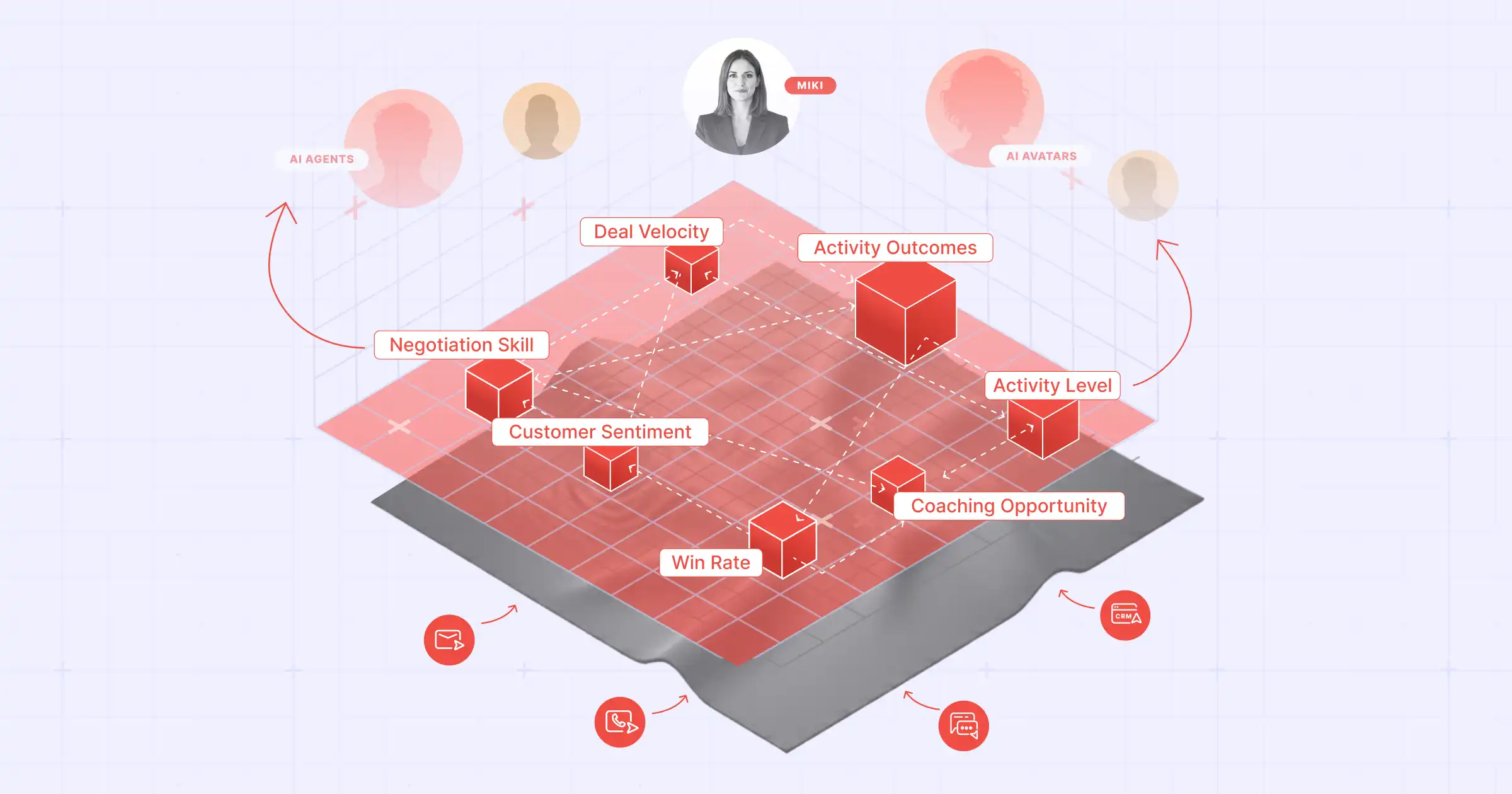Discussion with Bill Heil: Automating and Enriching the Sales Process Using AI
Jul 24, 2020
We recently had the opportunity to sit down with Bill Heil, a highly experienced Operations and Technology executive. Bill was formerly President and COO of web conferencing giant WebEx as well as a former SVP of Operations at the cloud infrastructure company VMWare. Bill is now focused on providing his unique line of insight to high growth companies as an Advisor. He recently joined the Aviso Advisory Board. While speaking with Bill, we were interested in learning about his career trajectory and how he got to where he is today. We were curious to pick his brain regarding his tremendous experience with collaboration software and strong operations lens. Below, you’ll find various video snippets and their transcriptions of our conversation with Mr. Heil as he shares the importance of rethinking the norm to achieve revenue success.

Aviso: What are you working on now & how did you get to where you are? Bill: Right now I’m an investor and advisor with companies -- most of them are enterprise companies. I’m also serving on several non-profit boards. I’d say the one common thing about every group I’m dealing with today is that everybody is dealing with the current situation -- current uncertainty in economic times. So how do you help out non-profits? How do the technology and enterprise companies help customers? That’s kind of the theme. I started off my career as a product guy; I was a product manager. And I always looked at, and I still look at, IP. What’s super important to me is the company that’s investing heavily in technology. Look at the amazing technology transformations over the last 20, 30, 40 years in tech. One thing that was always common in all those environments, the company invests super heavily in sales, and super heavily in R&D. Those groups got all the dough when it came to that. The thing that I noticed was that operations always kind of seemed to get the least amount of funding, the least amount of focus; the least amount of energy. So I decided to put my personal energy and time to work with business leaders, on the sales side and on the product side, to make sure that we always had the best people, the best systems, the best processes in place. It was really a simple idea yet it led to improving customer engagement, driving business, and reducing friction. I think this whole operations thing is a super interesting cultural part of a company. I always call the best operations people the operators of the business. And, to me, they’re the most important people. They work together as a team, they really make things work efficiently for the company effectively, and really help engagement with customers.

Aviso: What motivated you to join Aviso as a Board Advisor? Bill: I joined Aviso in late 2019, before all of this pandemic and economic uncertainty. And I joined because of the people really. I was introduced by the CIO of Fox, a great business partner of mine, and a friend of mine, and he introduced me to the company. And Aviso is really a compelling place. I had known and met KV Rao a long time ago, and his great work, and his work with his Wall Street partner to bring this interesting kind of quant technology forward to the enterprise space. I thought that was an interesting idea. Then, I ran into my first meeting with Aviso with Trevor, and Trevor, that guy is amazing. Super smart guy, analytic -- he’s a big quant teddy bear. He’s super passionate. I don’t know many CEOs that are experts in game theory; not too many that I know. He’s got great passion. And he has tons of experience in the enterprise, so he knows the enterprise in and out. He knows SaaS in and out. He’s very philanthropically inclined. He’s a great guy, building a great team. I think Aviso is working on an important problem for the world, which is -- how do you drive economic productivity in the world? You do that by making the sales process better. Automating it, enriching it, using AI. I thought that was fantastic. And I think Aviso has some of the best AI tech around. Using AI to automate different processes seems like it’s a new thing in the last four to five years. People are using it in different ways in their companies. But KV and Ander were doing this eight years ago; eight or nine years ago they started out with this approach. I think they have done a terrific job. Aviso has fantastic AI tech for the sales process. I think that’s great. I’m excited because customers like the product and get value, so that’s really an important test, to go, hey, are customers getting value? The ones that I’ve talked to Trevor and his team about are Dell, companies that people know, blue chip companies, Dell, MongoDB, Honeywell, Splunk, RingCentral, those kinds of companies. And it’s all about helping any kind of enterprise, whether you’re selling software, licenses, or renewals, support, services. But it’s helping those companies with the problems that they had before the pandemic, guidance, visibility. How do you sell more? Those kinds of things. I also like that the platform itself is a very interesting platform. I think it’s pretty quick to value. It can plug into all your systems that you have in your enterprise. It also pays for itself. You don’t need all of those CRM licenses, you can reduce that to help fund the platform. There’s a lot of promise of productivity tools for the last 35 years of enterprise space. There’s hundreds -- I saw some Gartner chart that must have had 400 CRM tools on it. But how many tools can you see that fund themselves, pay for themselves, and provide tremendous value to the company? So that’s really why joined -- I was driven by the people and the technology.

Aviso: If you had Aviso when you were running high-growth businesses, how would it have helped you drive results? Bill: I’d ask -- how would the outcome have changed? I think you’d say, well, for sure it would have improved forecasting. But if you think about it, how is forecasting important to operators? It’s important to shareholders, they care about that. It’s important to people who have expectations. But you invest your resources in the company. Just a simple example of forecasting: depending on what the forecast says, you can invest more in R&D, you can invest more in sales, you can invest more in remote locations, you can invest more in making your customer experience better. So just that simple thing is more efficiently investing. When I’ve worked at high growth companies, you never knew exactly what the growth rate is going to be, and you invested in some slightly more conservative way. Now, in sales, it would have changed everything. I’ve been through many different approaches to improve sales and sales productivity over many decades, so lots of things have been going on. But I have never seen this -- AI has a tremendous ability to sort out all the signals. There are so many signals in systems in a company. CRM kind of drove all of this, hey, let’s get all of these fields set up, and mostly it’s like an outbound reporting up to management of what’s kind of going on inside a company, and other parallelisms. But the AI can sort through this and say, hey guys, there’s five, eight, ten signals in your business that really drive what’s important. I think the AI can really spot things that the collective body of all of the operators in the company can’t figure out at a high level. They all know -- they’re all experts in their area, they’re experts in their signals of what works. In every dimension of a company’s workflow it would have got people to focus on what’s important. Every geo, every kind of channel. In the last company I worked with, at VMWare, we had every kind of channel. The end sales channel, renewal sales channel, services and report, direct, partner, all of those dimensions would have been helpful. I think it would have been super, super helpful, both in investing resources, and in improving sales velocity, and really simplifying what it takes to increase sales at a company.

Aviso: How does the current environment compare to previous downturns you have experienced? Bill: I think the single biggest thing is that this is global. If you think about the dimensions of this -- I’ve never experienced anything like this in my life, for sure. First of all, it’s all elements of people in your business. And who is that? That’s my employees, my customers, my shareholders, my partners, my supply chain. Everybody on Earth is affected by this thing. So that’s affected. So then if I’m building something that has any physical dimensions to it, any physical elements, all elements of my global supply chain have been disrupted somehow. So that’s like a stunning revelation for companies. People have been outsourcing more and more and more over the last -- decades and decades and decades, and they don’t realize how impacted their own supply chains are by global phenomenon. They didn’t build them to be resilient; they built them to be low cost, these supply chains. And then the third element is every single physical place you go has been affected on Earth, every building. Other than that, it’s just like every other downturn. It’s like there’s no baseline for the people that are running these companies today. They haven’t experienced this. I think everybody is reacting to this in their own way. How do you first start reengaging into this, and dealing with this pandemic?

Aviso: What role does technology play in enabling collaboration and remote work in this new normal? Bill: The shift to remote work is really getting people to think substantially different. I think there’s probably a five year acceleration in people’s mindsets about several digital transformation processes, like commerce is different, supply chains are different. But collaboration is a lot different in 2020 than it was last year. This is what’s important to balance an enterprise -- do I have access to everything I need digitally to do my work? People say, okay, we’re getting systems in place to do that. Can I do that securely? -- that’s another important question. People don’t think about the security of files and things that are now in the workplace. The CIOs have spent decades making sure their on-premise enterprise centers are super, fantastically safe and secure. That’s different in the remote workspace. Make sure your collaboration tools all work with each other. The things that seem to have an advantage in this collaboration space are kind of open system, open software system things that work together. I’m a big, gigantic fan of Zoom; I think Zoom is a tremendous platform, a lot of people are using it. There’s other great collaboration platforms out there but they’re tied into important workflow things, like Slack and Microsoft Teams, and those things around the world. It’s very important to have integration. Another dimension, if you’re thinking about remote work, is there are many elements of people’s business processes that aren’t digitized. If things aren’t digitized, it’s hard to deal with them remotely, from that standpoint. I’m super glad that the bandwidth of the internet is where it is today. If we had this pandemic seven to ten years ago, there’s no way there would have been video collaboration. I think there’s been this tremendous uptick of instant messaging globally in the last five years. WhatsApp is a phenomenon around the globe for instantly getting in touch with somebody, but what about video? Video is important to keep the connection with people remotely during all of this. In the early days of collaboration, it was about sharing a document. Now, the video collaboration is connecting with people. Face to face, let’s have a conversation. You and I are having a conversation now about what the future might look like, and what do we deal with? What are we dealing with with this pandemic? But this is a much different thing over IM, and it’s a much different thing over email, and it’s a much different kind of conversation over the phone. I think it’s lucky, in some sense, that the internet speeds and performance give high fidelity two way conversations, multi way conversations, with people these days, in the middle of all of this environment.

Aviso: How do the roles of COOs and CFOs differ in today's world? Bill: I think they’ve totally changed already. I’ve spoken to a lot of CFOs and COOs at the start of the year. And take a typical CFO, what are they doing now? There are cash WarRooms all around the globe. Nobody knew what a cash WarRoom was six months ago. What do I do with my assets? Scenario plan is gigantic. Nobody knows what the outcomes are going to be. Nobody knows when things are going to reopen. Nobody knows when their supply chain is going to be back online. You can’t plan for it, but you can say -- here are three or four different options, and let’s make sure we’re prepared for them. Scenario planning is important. Communication too; I think the CFOs are being super, super, super thoughtful now about communicating in a consistent way and about how they’re thinking about the new world and this new environment. They’re all looking at their investments and thinking: “How’s my balance sheet doing? How’s my M&A portfolio? Maybe it’s the time to buy some companies. Maybe it’s a good time to divest some things that aren’t so important to me.” I think CFOs are going through this very interesting time, where they’re really trying to help stabilize a ship moving forward in a sea of uncertainty. That’s their role. Now the COOs, they’re first noticing what this pandemic actually did. They’re thinking: “It disrupted my supply chain; I’d better work on that. It forced everybody to work from home. Oh, I’d better work on that. And it exposed all the places where I don’t have digitized processes in my company.” So I think the COOs are all around that whole thought process. How do you increase productivity through digital transformation? So there’s a great opportunity for COOs, for CIOs and business leaders to say, hey, we’ve found something wonky in our business. Maybe let’s take the sales process. And restarting that in our old normal way, the way we used to do business, isn’t appropriate anymore. Moving forward, in these different scenarios, it’s important we restart and think about how we can transform how we communicate with customers, how we help customers, how we can create resilience and reduce exposure to the business. They’re focused on the resiliency and stabilization of their operations. The more of a global company you are, the more issues you expose. I know I’ve talked to COOs that are now planning for 60% of their workforce -- and these are companies with tens of thousands of people, high tens of thousands -- to be remote when, before, it was in the 20% range. We’ve all heard stories of high tech companies saying, yeah, we’re going to have a 100% option for people to work remotely. So you have to think about what exactly is this global workforce? What does global work look like? What does remote work look like? In some sense, it’s a really exciting time. It’s high stress, I’m sure, for these folks, but it’s exciting that you can accelerate a place that you could have imagined your company being by five years. It’s like, yeah, I would have done it, it would have taken a long time, we would have used old processes. But people are getting a lot more clever about saying, hey, let’s do a little timeout here on this particular element of my business process, and look at how this could be totally different for our company and get us to the new normal. How can this get us to a place that’s stronger and more resilient?

Aviso: What has helped you stay productive while working from home? Bill: I think it’s important to have good meeting etiquette -- a basic, simple thing -- in conversations that you have with people online. And everybody is going through tens or dozens of meetings a day. It is super important to have a balance between work and life. I think everybody would agree with that. When I speak to people remotely on the phone now, I ask them how they’re doing. How are you doing? You talk to people that used to be working in call centers maybe for support on your internet or something, and now they’re working from home. How are they thinking about it? After talking to those folks, I’ve realized that I have to separate my work life and my life. That’s super important. Also, I’m involved in project work for nonprofits and with startups and I think having super clear is communications around a project is key. What are the goals we’re trying to achieve? What does accountability look like, and what are roles? It’s a simple thing, but there are a lot of newly formed digital collaboration tools. I get online with folks that are working on projects and talk about how Google Docs work and how we share it and those things, in a sharing sense of the world. But they know how they used to operate physically when they were working together in a conference room in a building, for example. You’ve got to stay healthy. You’ve got to stay focused on your health. So -- stay healthy, be positive and you’ll be ready for the next challenge that comes along.







